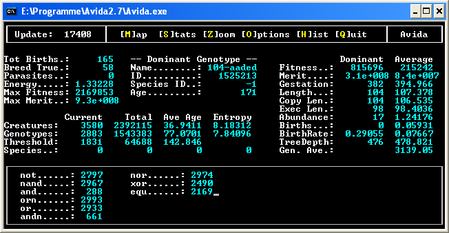Avida
Avida is an artificial life - software platform with the aim of evolutionary biology based proliferating and developing computer programs ( digital organisms ) to study. Avida was developed by Charles Ofrias Digital Evolution Lab at Michigan State University . It was originally designed in 1993 by Charles Ofria, Chris Adami and C. Titus Brown at Caltech , inspired by the Tierra AL system .
Design principles
Tierra simulates a system capable of evolution by introducing computer programs that compete with one another for operating resources , in particular computing time and access to main memory . In this respect there are similarities to Core War , with the difference that programs of the Tierra simulation can modify themselves and develop in this way. So Tierra's programs are AL organisms here.
In Avida , each digital organism lives in its own encapsulated memory area and is executed by its own CPU . Usually other digital organisms cannot read or modify this memory area, but can only execute code from their own memory area. In Tierra the organisms share a brain, so to speak, while in Avida each individual has his own.
A second major difference is that the virtual CPUs of different organisms can run at different speeds, so that organisms of two species do not execute the same number of CPU instructions in a given period of time. The speed is determined by various factors, mainly by the number of tasks that an organism executes: Tasks are logical calculations that, when completed, can get additional CPU speed as a bonus.
Application in research
Adami and Ofria, in collaboration with others, have used Avida to conduct research on digital evolution, and the science magazines Nature and Science have published several of their findings. Nature, published in 2003 The Evolutionary Origin of Complex features ( The evolutionary origin of complex properties ) in which the evolution of a mathematical equality operation of at least 19 simpler operations is constructed.
